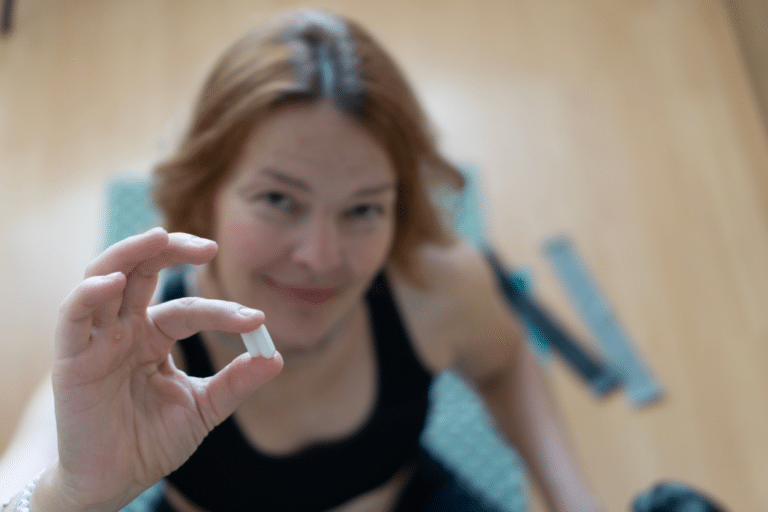If you’ve been feeling drained, foggy, or like your energy tank never fills up, no matter what you do, you’re not imagining it. The culprit might not be your age, hormones, or lack of willpower. It could be something much smaller but far more powerful: your mitochondria.
These tiny structures live inside your cells and act as your body’s power plants. They take the food you eat and the oxygen you breathe and turn them into energy. Without healthy mitochondria, your body and brain simply can’t run the way they should.
Let’s take a closer look at what mitochondria do, how they affect your midlife energy, and what you can do to help them thrive.
Your Energy Factory: What Mitochondria Really Do
Every cell in your body runs on energy called ATP (adenosine triphosphate). Mitochondria make that energy through a complex process that transforms nutrients and oxygen into usable fuel. When this system works well, you feel strong, alert, and capable.
But when mitochondria are overworked, under-nourished, or damaged, your “cellular batteries” lose their charge. The result? Fatigue, brain fog, slower recovery after workouts, and even signs of early aging.
Think of your mitochondria like baristas in a busy café. They’re the ones brewing up energy all day long. But when they’re short on supplies, running nonstop, and constantly dealing with stress, their output slows down. You still get your energy “latte,” but it’s weak and lukewarm.
How Midlife Affects Mitochondria
Hormonal shifts, stress, poor sleep, and nutrient depletion can all impact how efficiently your mitochondria produce energy. Estrogen, for example, plays a key role in mitochondrial function and antioxidant protection. As levels decline in perimenopause and menopause, mitochondria become more vulnerable to stress and damage.
That’s one reason why midlife women often notice a drop in stamina and mental clarity. But this isn’t an inevitable part of aging. You can train and nourish your mitochondria to work better, no matter your age.
How’s Your Mitochondrial Health?
If you check three or more of these boxes, your mitochondria might be asking for support:
☐ You wake up tired even after a full night’s sleep
☐ You rely on caffeine to get through the day
☐ You crash in the afternoon
☐ Exercise wipes you out instead of energizing you
☐ You have frequent brain fog or poor concentration
☐ You struggle to lose weight or maintain muscle
If this sounds familiar, don’t panic. The fix isn’t another energy drink or supplement stack. It’s about giving your mitochondria what they need to thrive.

Want to create a custom longevity health plan?
You’re in the right place.
I can help you with a functional approach to midlife women’s health including hormone balance, gut health, autoimmune issues, bone health, heart health and more!
5 Daily Habits to Recharge Your Cellular Batteries
1. Eat for energy, not just calories.
Focus on colorful plants, lean proteins, healthy fats, and whole foods that deliver vitamins and antioxidants. Nutrients like magnesium, B vitamins, CoQ10, alpha-lipoic acid, and carnitine all play roles in energy metabolism. These can come from food or, if needed, targeted supplementation.
Access my Mitochondrial Support protocol here.
2. Move your body.
Exercise is one of the most powerful ways to improve mitochondrial health. Aerobic activity helps your cells make new mitochondria, while strength training keeps them efficient. Even brisk walking or dancing counts.
3. Prioritize real rest.
Sleep is when your cells repair and recharge. Aim for 7–9 hours each night and protect your bedtime like it’s sacred. Chronic sleep debt drains your mitochondria faster than almost anything else.
4. Manage stress.
Chronic stress floods your body with cortisol and inflammation, both of which damage mitochondria. Incorporate short daily resets like deep breathing, journaling, or time in nature.
5. Minimize toxins.
Limit exposure to smoking, pollution, and processed foods. These add oxidative stress that harms mitochondria. Support detox pathways with hydration, fiber, and cruciferous vegetables like broccoli and kale.
Myth-Busting: Common Mitochondria Misconceptions
Myth 1: Mitochondria naturally decline with age, and there’s nothing you can do.
- Truth: Mitochondria are dynamic. They constantly renew and adapt. Exercise, nutrition, and targeted nutrients can improve both their number and performance.
Myth 2: Fatigue is just a normal part of getting older.
- Truth: It’s common, but not normal. Midlife fatigue is a signal that your body needs cellular support, not a reason to settle for low energy.
Myth 3: Supplements alone fix poor energy.
- Truth: Supplements can help, but they’re not magic pills. The foundation is movement, rest, and real food. Supplements are the fine-tuning, not the engine.
A Quick Success Story
I once worked with a woman in her early 50s who came to me exhausted, foggy, and frustrated. Her labs looked “fine,” yet she could barely get through the day. Once we addressed mitochondrial support through better nutrition, sleep hygiene, and stress management, her energy began to shift within weeks. She didn’t just feel better—she felt alive again.
Her story isn’t rare. It’s what happens when you give your cells what they’ve been missing.
Your Mitochondria and Longevity
Healthy mitochondria don’t just give you more energy today, they’re central to how you age. They influence inflammation, metabolism, brain health, and even how efficiently your body repairs itself.
This is where mitochondrial health connects directly to healthspan, the number of years you live with vitality, not just in survival mode. Every choice you make now helps determine how well your body performs decades from today.
Where to Start
You don’t have to overhaul your entire life. Choose one or two small actions to begin:
- Add more color to your plate this week.
- Go for a 20-minute walk after dinner.
- Commit to a set bedtime for five nights in a row.
- Practice one stress-relief tool daily.
Small steps compound over time, just like compound interest, but for your health.
The Bottom Line
If you’re tired of feeling tired, it’s time to look deeper than caffeine or motivation. Your energy comes from your cells, and your cells depend on healthy mitochondria. The good news? You can rebuild their strength through simple, consistent habits that nourish, move, and protect your body.
Your mitochondria are ready to work for you. It’s time to give them the support they deserve.
References
- Chen, W., et al. (2023). Mitochondrial dynamics in health and disease. Signal Transduction and Targeted Therapy, 8(1), 83. https://doi.org/10.1038/s41392-023-01547-9
- Kyriazis, I. (2022). The impact of diet upon mitochondrial physiology. Frontiers in Nutrition, 9, 871460. https://doi.org/10.3389/fnut.2022.871460
- Cart, C. (2025, June 10). The importance of mitochondria & what nutrients support their health. Institute for Functional Medicine. https://www.ifm.org/articles/nutrients-to-support-mitochondria
- Harvard Health Blog. (2021, March 31). Mitochondria do a lot for you: What can you do for them? Harvard Health Publishing. https://www.health.harvard.edu/blog/mitochondria-do-a-lot-for-you-what-can-you-do-for-them-2021033022264
- The Multifaceted Contributions of Mitochondria to Cellular Metabolism. (2019). Cell Metabolism, 30(4), 746-773. https://doi.org/10.1016/j.cmet.2019.07.007
Dr. Anna Garrett is a menopause expert and Doctor of Pharmacy. She helps women who are struggling with symptoms of perimenopause and menopause find natural hormone balancing solutions so they can rock their mojo through midlife and beyond. Dr. Anna is the author of Perimenopause: The Savvy Sister’s Guide to Hormone Harmony. Order your copy at www.perimenopausebook.com.
Dr. Anna is available for 1-1 consultations. Find out more at www.drannagarrett.com/lets-




